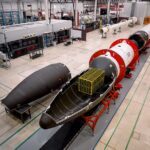Table of Contents
ToggleArtificial Intelligence: A Geopolitical Pivot in the 21st Century
In the 1950s, Isaac Asimov envisioned thinking machines in his iconic work, I, Robot. Fast forward to today, and artificial intelligence (AI) has transcended the realm of science fiction, emerging as a transformative force across various industries. More than just an innovation, AI has become a vital geopolitical asset, capable of serving both as a defense mechanism and a weapon for strategic advantage. World leaders, including Russia's Vladimir Putin and China's Xi Jinping, acknowledge that mastery over AI technologies will grant any nation a significant edge in shaping global leadership.
AI Revolutionizing Defense Strategies
Óscar Méndez, president of the Generative AI Association (GenAiA), emphasizes, “Today, we have systems capable of ‘thinking'—not in a human manner, but in a robust and unique way.” He notes that AI is dramatically reshaping defense, affecting everything from military strategy to operational execution. Advanced systems can analyze satellite images, detect crucial patterns, and review vast amounts of data, which can be indispensable in defense contexts where human analysts are outnumbered by incoming information. “These models are multimodal, capable of integrating vision, text, and programming,” Méndez adds.
The Urgent Need for Ethical AI Development
Given its power and potential, AI presents not only opportunities but also risks. “AI is crucial, akin to atomic energy—it harbors destructive potential if left unchecked,” warns Méndez. Countries that fail to harness their own AI capabilities risk becoming reliant on external technologies, compromising their autonomy. Unfortunately, Europe lags behind nations like China and the United States, which produce the majority of patents in AI. “Although Europe has made commendable strides, such as developing models for European languages with initiatives like the ALIA project, it still falls short,” he notes. “To achieve sovereignty, Europe must commit to creating its own technological engines.”
Moreover, Méndez argues that Europe has a unique responsibility to cultivate technology that prioritizes ethical standards. “Europe stands as a region genuinely free from the extremes of unbridled capitalism and technological authoritarianism,” he asserts. Its social model aims to safeguard citizens and should be preserved. He further emphasizes, “Regulation does not stifle innovation; rather, the absence of support for a thriving ecosystem of small and medium-sized enterprises (SMEs) does.” In defense, reliance on a singular national champion is insufficient. A collaborative network involving startups and SMEs alongside larger corporations is essential.












